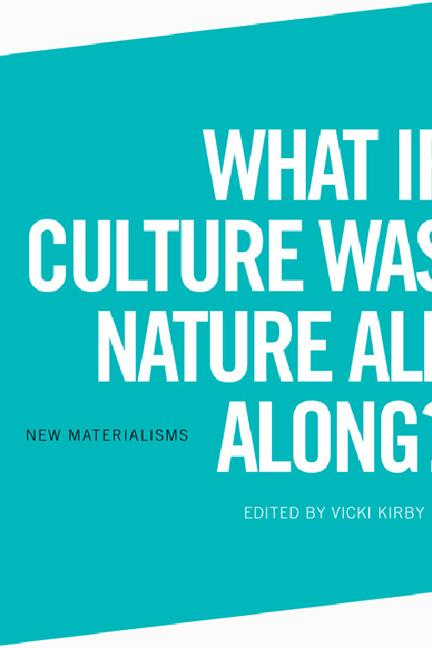Book contents
- Frontmatter
- Contents
- Acknowledgements
- Foreword
- 1 Matter out of Place: ‘New Materialism’ in Review
- 2 Method Matters: The Ethics of Exclusion
- 3 Sensory Substitution: The Plasticity of the Eye/I
- 4 Allergy as the Puzzle of Causality
- 5 Pregnant Men: Paternal Postnatal Depression and a Culture of Hormones
- 6 Material Culture: Epigenetics and the Molecularisation of the Social
- 7 Racialised Visual Encounters
- 8 Microbiology as Sociology: The Strange Sociality of Slime
- 9 Nature Represents Itself: Bibliophilia in a Changing Climate
- 10 Climate Change, Socially Synchronised: Are We Really Running out of Time?
- 11 A Sociality of Death: Towards a New Materialist Politics and Ethics of Life Itself
- Notes on Contributors
- Index
5 - Pregnant Men: Paternal Postnatal Depression and a Culture of Hormones
Published online by Cambridge University Press: 22 December 2017
- Frontmatter
- Contents
- Acknowledgements
- Foreword
- 1 Matter out of Place: ‘New Materialism’ in Review
- 2 Method Matters: The Ethics of Exclusion
- 3 Sensory Substitution: The Plasticity of the Eye/I
- 4 Allergy as the Puzzle of Causality
- 5 Pregnant Men: Paternal Postnatal Depression and a Culture of Hormones
- 6 Material Culture: Epigenetics and the Molecularisation of the Social
- 7 Racialised Visual Encounters
- 8 Microbiology as Sociology: The Strange Sociality of Slime
- 9 Nature Represents Itself: Bibliophilia in a Changing Climate
- 10 Climate Change, Socially Synchronised: Are We Really Running out of Time?
- 11 A Sociality of Death: Towards a New Materialist Politics and Ethics of Life Itself
- Notes on Contributors
- Index
Summary
Introduction
The notion that postnatal depression (PND) may be experienced by fathers in a similar incidence to mothers (of around 10–13 per cent) is beginning to ‘emerge from the wings’ (Solantaus and Salo 2005), complicating ideas that PND may be understood as maternal hormonal fluctuations after the birth of a child. Even with the establishment of an overarching bio-psycho-social model of depression, however, it seems that fathers’ PND has been elaborated in juxtaposition to that of mothers as primarily psycho-social in origin. Yet how can we ignore the biological evidence of what is happening within fathers’ bodies over the puerperal period, especially considering that levels of cortisol, vasopressin, oxytocin, testosterone and oestrogen vary in fathers’ bodies before, during and after the birth of a child? These hormones and their variations could be regarded as intrinsic to a mode of being that is, in a sense, expectant: just as men may embody PND, fathers, too, may be(come) pregnant. Yet how can we reach this understanding when it seems to defy the facts of biology? How can we situate this suggestion with regard to conventional dualisms that oppose sociality and biology, epistemology and ontology, mind and body, male and female? By investigating the sociality of hormones I will argue that the notion of a pregnant father and biologically postnatally depressed male is not made in defiance of biology; it is, rather, an active material engagement with it. Approaching contemporary anthropological, sociological and feminist debate on embodiment and hormonal constitution, my argument travels through and with fathers’ bodies via key puerperal hormonal phenomena that pinpoint a few crucial ways in which the binary of nature and culture can be reconsidered and made more complex, more attentive to, and more telling of, somatic experience.
Endocrinological Actors
For centuries there has been an awareness that certain difficulties can accompany the pregnant and postnatal female body, and that this time is associated with risk to the health of both mother and child. What was to become classified as ‘postnatal depression’ in the 1950s after medical observation of a particular depressive pattern amongst new mothers (Everingham et al. 2006: 1745), seems to have been implied since Hippocrates’ notions of disorders relating to the ‘wandering womb’ (Bleier cited in Nicolson 1998: 41; Ussher 2006: 91).
- Type
- Chapter
- Information
- What if Culture was Nature all Along? , pp. 90 - 109Publisher: Edinburgh University PressPrint publication year: 2017



